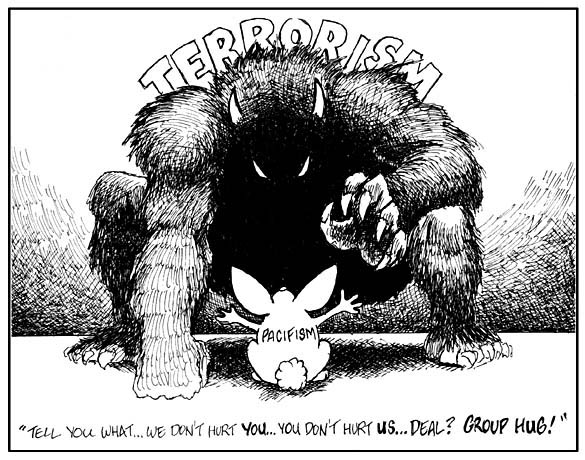Abril 17, 2004
EUROPE IS STILL NOT READY TO FIGHT

Coming soon after the Madrid attacks, also carried out by "sleepers," the British success in smashing a terrorist ring might appear reassuring. The truth, however, is that Europe remains extremely vulnerable to Islamist terror attacks. And for this, it mostly has itself to blame.
Having failed to develop a common strategy against terror in their latest ministerial conferences and summits, the European Union members are now trying to pass the buck to the G-7 summit, due to be hosted by the US in June. The problem is that the G-7 has already discussed terrorism at length. At the Halifax, Canada, summit in 1995 the G-7, joined by Russia, declared terrorism "a serious threat" to international peace. The following year's summit, held in Lyon, France, came up with a raft of measures to combat terrorism that was designated as "a clear and present danger to international law and order."
Nevertheless, of the 44 measures approved at Lyon, only 11 have been included in the national legislations of the countries concerned.
There are at least three reasons why the major powers have been reluctant to treat the war on terror as a genuine war. The first is that many Western leaders cannot free themselves from the philosophy represented in this celebrated adage: One man's terrorist is another's freedom- fighter.
This leads to a division of terrorist movements into good ones and bad ones.
Comenta sobre el caso del 11M:
In some cases, Western elites manifest their pernicious admiration for some terrorist groups by using the phrase "resistance movement." A good part of the European media has banned the very term "terrorist" as an adjective for organizations that kill civilians in the name of this or that cause, replacing it by euphemisms such as "militant," "radical" and, borrowing a term from Noam Chomsky, "people-based."
Few noticed that Jose Luis Zapatero, leader of Spain's Socialist Workers' Party, used the term "Arab resistance" throughout the March election campaign in order to avoid the term "al-Qaida," which had been favored by his rival, former prime minister Jose Maria Aznar.
The second reason many Western governments are not serious about the war on terror is the temptation to obtain an opt-out from the terrorist threat.
La conclusión de Taheri no puede ser más rotunda:
Sometimes the illusion that terrorists can be integrated into the normal political process leads to absurd claims. For example, there are those who call for "some form of negotiations" with the remnants of the Taliban or even what is left of al-Qaida. What these would-be dealmakers do not realize is that terrorists of the Taliban and al-Qaida type do not believe in compromise and give-and-take. They would not be satisfied even with an unconditional surrender on the part of their real or imagined adversaries.
For the global war on terror to succeed, it is imperative that all those fighting it convince themselves that there is no good terrorism, and that the real or imagined nobility of a cause cannot justify the murder of innocent people.
by Amir Taheri
Jerusalem Post
April 17, 2004
http://www.benadorassociates.com/article/3517
Según la Real Academia de la Lengua Española, y supongo que el término inglés significará lo mismo, terrorismo es una "forma violenta de lucha política", es decir, de consecución de unos objetivos políticos "por medio de la intimidación de los adversarios o de la población en general creando un clima de terror e inseguridad". Querer desvincular los efectos de las causas nunca nos va a llevar a ninguna parte. Como tampoco nos va a llevar a ninguna parte, amén de ser incoherente, buscar la calma a través de la violencia. Por eso estoy totalmente de acuerdo con la última afirmación del texto: y por eso tan cierto como que no hay terrorismoo bueno es que no hay guerra buena, y mucho menos guerra pacífica, y la "real o imaginaria nobleza de una causa no puede justificar el asesinato de gente inocente", incluyendo los eufemísticos daños colaterales de todas las nobles empresas emprendidas en nombre de la paz y la seguridad mundial, que son causas mucho más nobles que el afán de perpetuar un orden (o tal vez habría que decir desorden) internacional basado en la desigualdad y los intereses económicos. Si vale, y yo creo que vale, vale para todos.
En cuanto a la negociación con los terroristas (yo prefiero el término diálogo, no porque lo acuñe Zapatero que ya estoy escuchando tu carcajada sino porque "negociar" suena a mercantilismo y "dialogo" a entendimiento), parafrasearé a no recuerdo quién: puede que no consiga los fines perseguidos, pero al menos producirá menos muertos.
Y el café,¿mañana? y lo tratamos en vivo.
Chloe et Dave Abril 18, 2004 10:30 PMEl café mañana, a la hora que digas (yo tengo el horario más flexible). Si te parece bien me buscas o, si lo prefieres, mi nick es aisabela, por si quieres mandarme un mensaje al pc para que baje.
catana Abril 19, 2004 11:20 PM